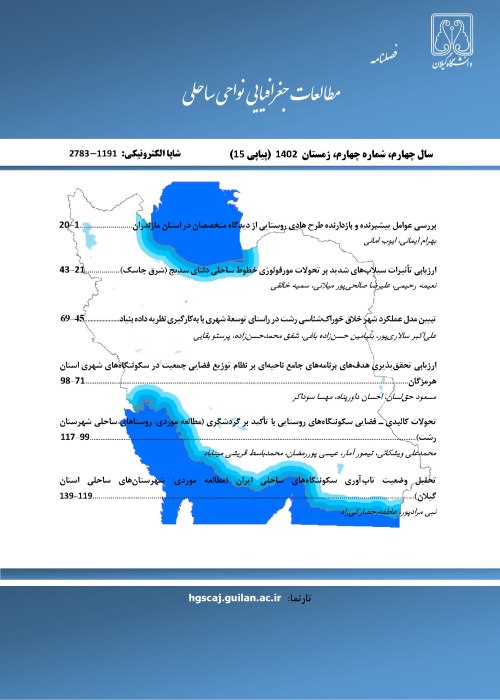Analysis of Factors Affecting the Success of Agricultural Land Integration Plan (Case Study: Chubar Rural District, Shaft county)
The integration process in less developed or developing countries seems an undeniable necessity due to geography, economic growth, high rural population, deprivation, extreme poverty, unemployment, and inflation (which are common in these countries). Therefore, this study aimed to identify and analyze the factors affecting the success of the agricultural land integration project with an emphasis on global experiences. The research method was descriptive-analytical and applied. The data collection method was library and survey (observation and questionnaire - farmers and experts). The study area included 11 villages out of 35 villages in the Chubar rural district where the land integration plan has been implemented. The number of households in the Chubar district included in the land integration plan was 1137, from which 285 farmers were selected using the Morgan table. Also, 13 agricultural Jihad experts and 7 university professors were selected as the research population for the opinion polls. Findings of the research using the confirmatory factor analysis method showed that based on the coherence and integration of indicators, three influential factors in the implementation of land integration plan and its success were identified, named as follows: 1-The factor of new agricultural technologies with a factor weight of 1.7; 2- Productivity and employment indicators and the underlying factor, which is the management and productivity factor with a factor weight of 1.66; 3- The third influential factor from the experts' point of view is the mechanization factor with a factor weight of 1.464, which is obtained from the indicators of using machines and ease of access to devices and labor. It should be noted that according to the mentioned factors, the success rate of the agricultural land integration plan in Chubar village has been higher than average. Extended Abstract Introduction The rural economy is closely related to agricultural activities and land productivity. Severe land segmentation as one of the most important challenges of rural economy leads to a decrease in production and consequently individual incomes of farmers, economic and social instability and reduction of food security, decrease in employment and income, and the increase in migration in rural areas. The integration process in less developed or developing countries in terms of geographical status, economic growth rate, and also due to high rural population, deprivation, severe poverty, unemployment, and inflation (one of these countries' commonalities) seems to be an undeniable necessity. Today, the factors contributing to the success of agricultural land consolidation in new land management approaches are using scarce resources to achieve the desired result, the sustainable socio-economic revitalization, and political development emphasizing the "local community" factor. Therefore, increasing farmers' awareness about the economic and social outcomes and the transfer of useful information to farmers by promoters and government support programs to attract the participation of stakeholders and beneficiaries in both the decision-making and implementation stages is an undeniable necessity.MethodologyThe research method was descriptive-analytical and applied. The data collection method was library and survey (observation and questionnaire - farmers and experts). The study area included 11 villages out of 35 villages in the Chubar rural district where the land integration plan has been implemented. The number of households in the Chubar district included in the land integration plan was 1137, from which 285 farmers were selected using the Morgan table. Also, 13 agricultural Jihad experts and 7 university professors were chosen as the research population for the opinion polls.Results and discussionFindings of the research using the confirmatory factor analysis method showed that based on the coherence and integration of indicators, three influential factors in the implementation of land integration plan and its success were identified, named as follows: 1-The factor of new agricultural technologies with a factor weight of 1.7; 2- Productivity and employment indicators and the underlying factor, which is the management and productivity factor with a factor weight of 1.66; 3- The third influential factor from the experts' point of view is the mechanization factor with a factor weight of 1.464, which is obtained from the indicators of using machines and ease of access to devices and labor. The results were in line with Bouzarjomehri and Enzaei (2012), who acknowledged the implementation of the integration plan with the presence of effective criteria for achieving the quantitative and qualitative goals of the plan to achieve potential in rice production, taking measures to equip lands and exploiters to the new knowledge are essential. One of the things that contribute to the quantitative and qualitative development of rice cultivation was the successful implementation of the project in terms of technology. The result was also consistent with Rezaei Moghadam et al. (2014), that farmers with more access to the extension services on integration information had better attitudes and participation in the implementation of integration, therefore more willing to participate in the social activities.ConclusionIn terms of institutionalism, by enacting a law on the property rights in agricultural lands, regardless of the political and social structures of the region, the government can not expect property rights to be observed there. Also, decentralization and leaving decisions on the local issues (development and construction projects) to local members, given that they have a clear picture of local facilities and conditions, is something that can be the beginning of low-level institutionalization and create competition and success of agricultural development projects (land consolidation). From the perspective of communication planning, planning should be operational in such a way that the opinion of all different groups of farmers in the villages is attracted, and the intra-group and out-of-group relationships and communication networks should be strengthened. On the one hand, developing capacity, and strengthening the capabilities of the society, empowers individuals, organizations, and groups in implementing and executing programs. Also, the presence and participation of local community residents is one of the main pillars in the implementation of development projects, so it is important to believe that social capital is the main factor in creating solidarity and collective interest among farmers and is the driving force behind all kinds of active social movements in different areas.FundingThere is no funding support.Authors’ Contribution Authors contributed equally to the conceptualization and writing of the article. All of the authors approved the content of the manuscript and agreed on all aspects of the workConflict of InterestAuthors declared no conflict of interest.Acknowledgments We are grateful to all the persons for scientific consulting in this paper.
- حق عضویت دریافتی صرف حمایت از نشریات عضو و نگهداری، تکمیل و توسعه مگیران میشود.
- پرداخت حق اشتراک و دانلود مقالات اجازه بازنشر آن در سایر رسانههای چاپی و دیجیتال را به کاربر نمیدهد.




